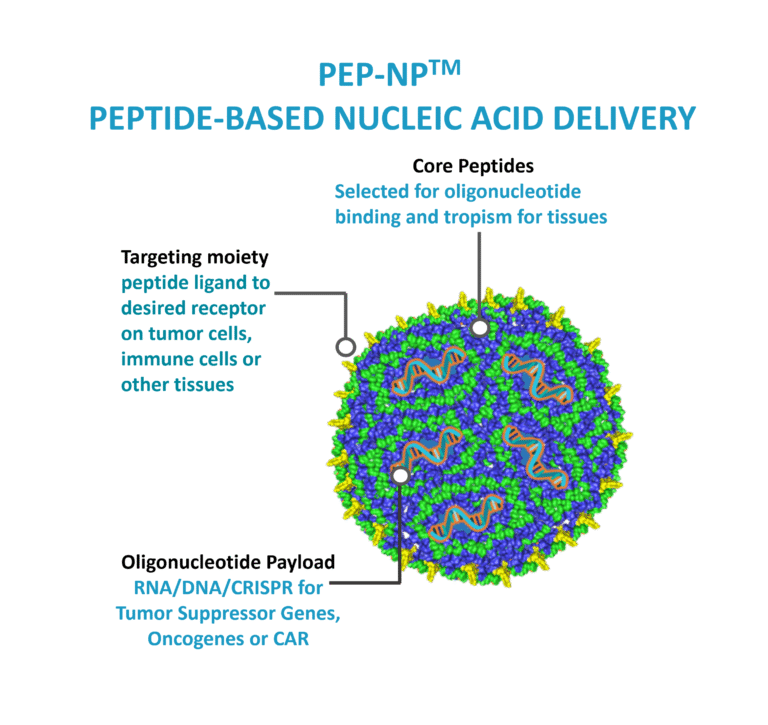At AANASTRA we create the next-generation RNA therapeutics by combining engineered RNA with precision-designed targeting peptides—delivering breakthrough treatments that attack cancer, autoimmune, and genetic diseases at their source
AANASTRA’s Breakthrough RNA Strategies Driving Next-Gen Therapies
- Tumor Suppressor Rescue (TSG-RESCUE™): Restoring key tumor suppressors (p53) in cancers driven by loss-of-function mutations—addressing over 400,000 new U.S. cases annually, with no effective options today.
- In Vivo CAR-T (PEP-CAR™): Transforming T cells within the body—revolutionizing anti-CD19 CAR-T therapy for blood cancers and autoimmune disease, minimizing toxicity and complexity for well over 100,000 individuals with cancer and over a million individuals with autoimmune disease every year.
- Oncogene Editing/Deletion (ONCOEDIT™): Targeted in vivo deletion or silencing of oncogene mutations (KRAS G12D/V)—directly addressing over 110,000 new U.S. cases annually and overcoming drug resistance.
Precision RNA Delivery With Proprietary Peptide Technology
- An extra-hepatic RNA strategy that requires specific cellular targeting cannot work without an efficient and safe carrier that can get the RNA to its desired site of action.
- Unlike viral and lipid systems, our versatile PEP-NP™ technology surmounts the greatest challenge in RNA therapeutics: precise and safe systemic in vivo cellular targeting and efficient cellular release—enabling a new era of
programmable molecular medicine. - Aanastra targets its engineered RNA molecules with its proprietary targeting peptides (PEP-NP™) to create groundbreaking therapies for cancer, autoimmune, and genetic diseases—enabling safe, repeated, and highly selective in vivo delivery of RNA therapeutics.

Advances in RNA Therapeutics and Limitations
There has been high level of recent interest in gene modulation with RNA based technologies (RNA translation, RNA interference, gene editing, etc). Delivery Systems for RNA (currently viral or lipid based) are essential because RNA can cause strong immune/cytokine responses and are highly susceptible to degradation. However, most delivery systems (e.g., lipid nanoparticles or viral-based systems) accumulate in the liver or result in immunogenicity after IV (systemic) administration, cause toxicity, and there are no good strategies for effectively targeting disseminated diseases like cancer that required repeated treatment over the long-term.
The current RNA therapeutic applications are therefore limited to vaccines (local IM injection), ex vivo gene manipulation/editing (CAR-T, sickle cell), local delivery (eye) or liver-based diseases. Effective extra-hepatic targeting (e.g., for solid tumors) remains a major stumbling block in the development of RNA therapeutics
Limitations of Cancer Therapy Today
The root cause of most cancers – i.e., alterations/mutations in Tumor Suppressor Genes (TSGs) and Oncogenes (OGs) often cannot be directly targeted (only ancillary and secondary targets resulting from these gene alterations may be targetable). Currently available approaches in targeted therapy, e.g., with small molecules, most often result in build-up of resistance over time due to development of alternate and redundant biological signaling pathways and cause ultimate failure of the treatment.
Immunological and cellular approaches, e.g., ex vivo CART therapy, have shown much promise in recent years, but ex vivo CAR T faces challenges including complex manufacturing, scalability issues, high costs, and safety concerns from lymphodepletion.
Aanastra's Approach for the Future of RNA-based Treatment - getting to the root of the problem
Restoring, replacing or removal of the culprit mutated genes as a strategy to treat cancers remains an untapped area. Aanastra’s approach to targeting Tumor Suppressor Genes and Oncogenes can provide a major advance in treatment of cancer. Aanastra scientists have demonstrated these approaches in numerous studies in therapeutic cancer models including lung cancer, colorectal cancer, pancreatic cancer and osteosarcoma against mutated targets like P53, BRCA1 and KRAS utilizing the selective tumor targeting ability of the PEP-NPTM technology.
In vivo CAR T generation by selectively targeting T-cells in the body with the PEP-NPTM technology produces anti-CD19 CAR T cells in vivo resulting in the depletion of B cells responsible for hematological malignancies and certain autoimmune diseases. This approach has advantages over lentiviral or lipid nanoparticle vectors which are limited by challenges in repeat dosing due to immunogenicity or liver toxicity.
